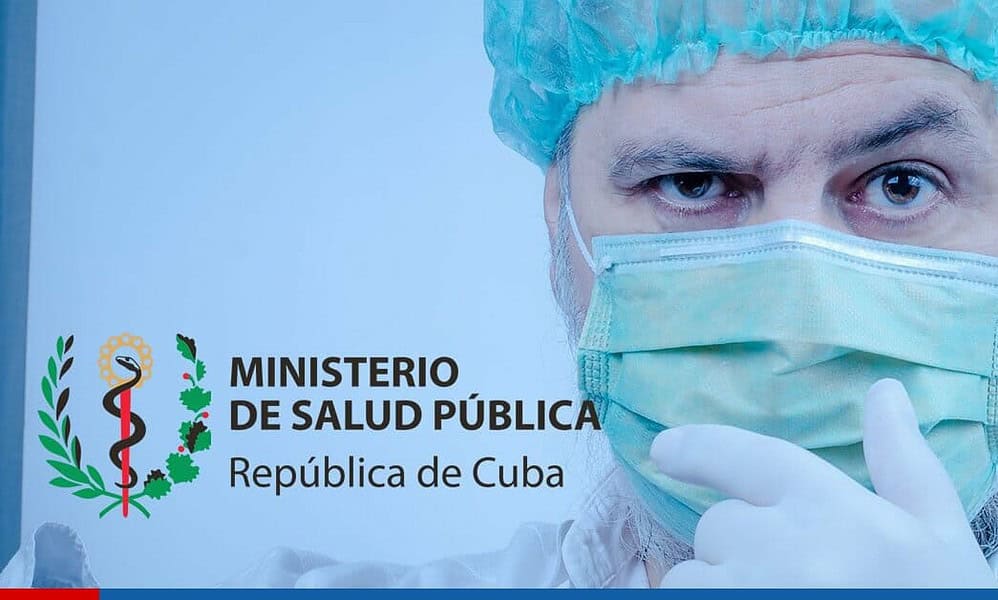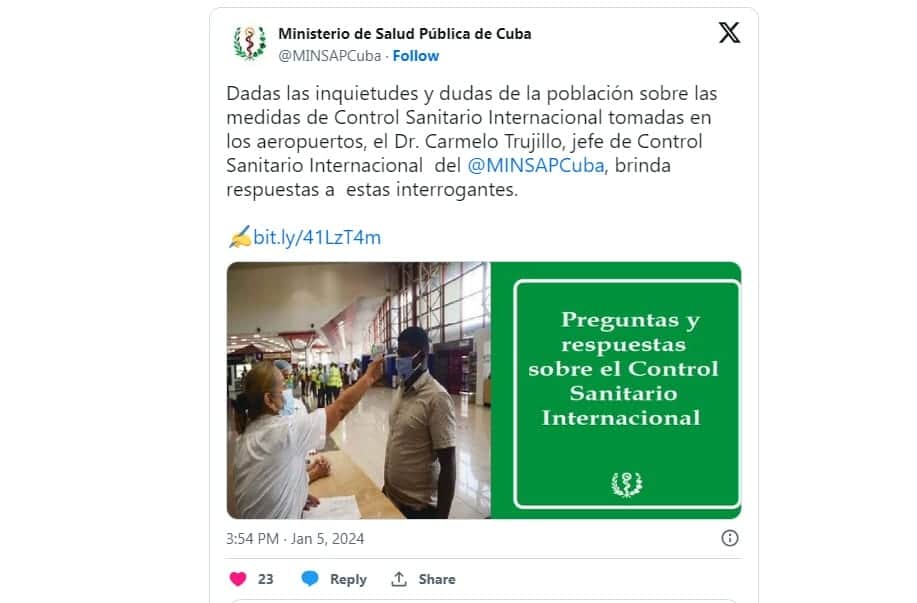MINSAP issues note on health control in Cuba

The Cuban Ministry of Public Health (MINSAP) published updated information on health controls at Cuban airports and on the island.
Among the elements that stand out the most are that travelers do not need to present a negative test for C0VID-19, or vaccination, and there is no obligation to attend family doctor’s offices.
Because of its importance, cuba directory Presents answers to the most frequently asked questions on this topic published in official site of MINSAP on this January 5, 2024.
Which C0VID-19 test do I need to take to travel to Cuba?
r/Travelers who arrive in Cuba through any of our entry points, regardless of their country of origin and their vaccination status, are not required to present a negative C0VID-19 test.
Which vaccination certificate should I present upon arrival and which vaccines are accepted in Cuba?
A/Travellers are not required to present a certificate of vaccination against C0VID-19 upon arrival in Cuba. Travelers to Angola, Brazil or any other area or country with transmission of yellow fever must present an International Certificate of Vaccination against this disease if requested by a health authority (International Health Control).
When I arrive in Cuba, will there be any testing related to COVID-19 or any other disease under surveillance?
A/No, only travelers who are asymptomatic or have respiratory symptoms upon arrival in Cuba will be given a rapid test for C0VID-19 or a sample will be taken for PCR.
What measures or recommendations have health authorities implemented regarding C0VID-19 for travelers arriving to Cuba?
Regardless of the origin of travelers, their nationality and the purpose of the trip, the following recommendations are made:
- The use of masks is recommended inside aircraft and air terminals, especially in places where there are crowds of people. The use of masks has also been recommended on public transport.
- During arrival or departure from the country, the use of hand disinfection stations installed at all entry points into the country is recommended.
- Travelers are also recommended to inform themselves about the health requirements established by the countries they wish to travel to by consulting the website www.es.kayak.com/travel-restrictions,
I am Cuban and I am returning to Cuba after a trip or I intend to enter Cuba to visit family and friends. What should I do when I arrive at my residence area?
R/All Cuban travelers, non-resident Cubans and foreigners residing in the country must present themselves to their family doctor or, failing that, to the Sub-Directorate of Epidemiology within the first 24 hours of arrival. Area. health or polyclinic where you live; You are also obliged to inform your doctor or family nurse about the following aspects:
- Your status as an international traveller.
- If you have been exposed to any illness during your trip abroad and if you experience any signs or symptoms of illness, look for the most accurate information.
- Follow the instructions and recommendations of the family doctor and nurse, which will be in accordance with the epidemiological risk represented by the country or region where you have visited abroad, as well as the indications set out in the national program and protocol. International Health Control.
- You should be alert to any manifestations of communicable disease for at least 90 days after returning to the country and if you notice any signs or symptoms of illness, go immediately to your family doctor or to an institution of the national health system Always emphasize your international traveler status.
Why is traveling abroad risky and what precautions should I take to protect my health while traveling?
r/Every traveler who leaves Cuba to go to any country in the world, regardless of the reason, suffers diseases that do not exist or are controlled in our country, and other diseases that exist in Cuba , but in a different context epidemiology, climate science and social.
If you become sick while living abroad or upon returning to Cuba, you may put the health of your family and your community at risk. For these reasons, the traveler should take the following precautions before and during his stay abroad:
Before travelling:
- Before traveling, you should inform yourself about the main health, climate or other problems that exist in the country or region you will visit.
- Avoid traveling if you are suffering from any chronic non-communicable disease.
- If you are suffering from a chronic non-communicable disease, carry with you the necessary treatment, covering the entire period of your stay in the said country, as well as the necessary documents, as appropriate, that you have taken Justify the use of medicines.
- You must also undergo any pending medical procedures prior to travel to prevent damage or ensure your good health during your travel.
- You will be attentive to the health and vaccination requirements demanded by the authorities of the country or countries you intend to visit, as well as to the sanitary, hygienic and prophylactic measures imposed by the various countries.
During his stay:
- It will comply with hygienic, sanitary and prophylactic measures imposed by various countries.
- Do not eat foods of unknown origin or with appearance and characteristics that raise doubts about their quality.
- Do not drink water that is not of certified quality; You have to keep in mind that in many countries around the world water distributed through hydraulic networks is not authorized for drinking.
- By using skin-protective clothing, repellents and other products that are guaranteed not to be exposed, you will protect yourself from insects and vectors, especially those that can transmit diseases such as mosquitoes, ticks, etc.
- Avoid traveling to areas where diseases unknown in our country spread or are subject to other international health controls such as malaria, yellow fever, cholera, Ebola, etc.

(TagstoTranslate)Cuban Airports(T)Health Control(T)Cuba(T)Measures(T)MINSAP(T)News from Cuba